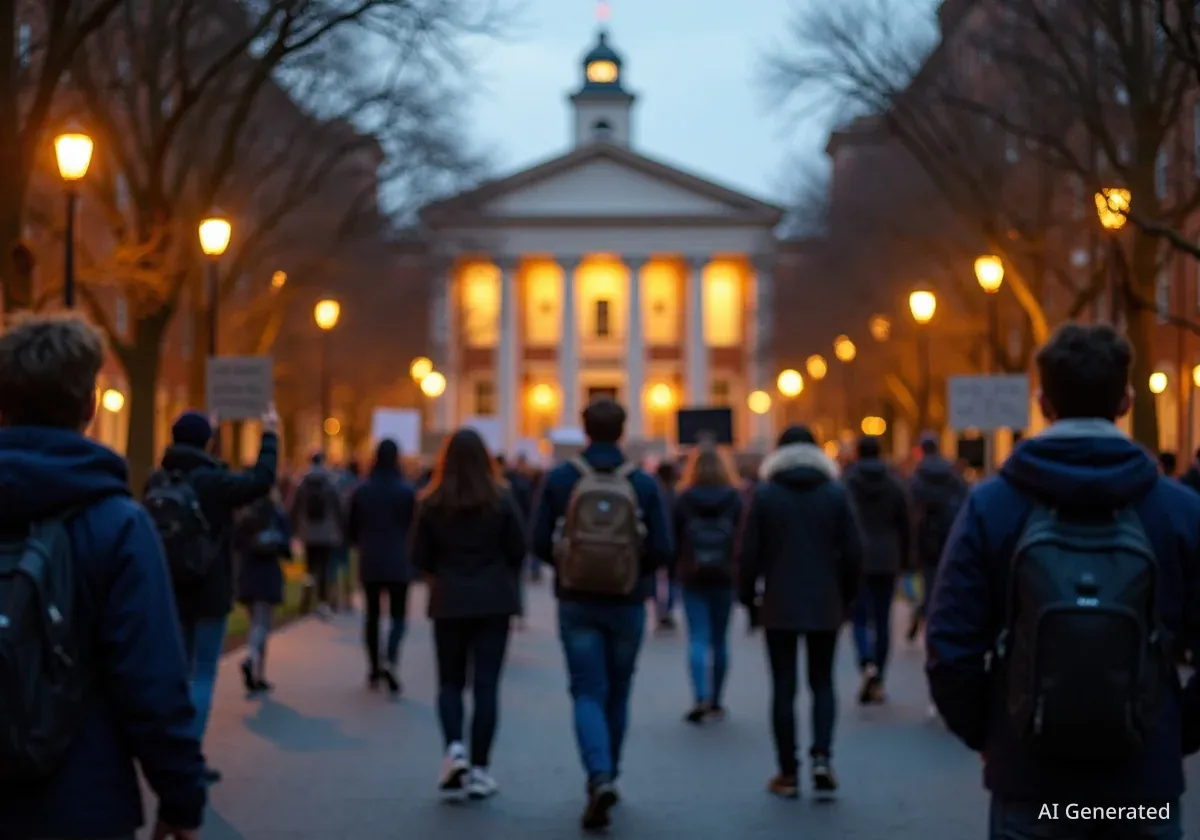Students, faculty, and community members gathered at Texas A&M University on Monday evening to protest a series of recent administrative actions, including the termination of a professor and the resignation of the university president. Organizers stated the demonstration was a direct response to what they see as growing threats to academic freedom on the College Station campus.
Key Takeaways
- A protest was held at Texas A&M's Academic Plaza in response to recent leadership changes and concerns over academic freedom.
- The demonstration was organized by the Texas Aggie Democrats and attended by dozens of students, faculty, and community members.
- Key issues cited by protesters include the termination of English professor Dr. Melissa McCoul and the resignation of University President Gen. Mark A. Welsh III.
- Speakers at the event alleged a pattern of political influence affecting university decisions and undermining the institution's credibility.
Demonstration Highlights Growing Campus Unrest
On Monday, the Academic Plaza at Texas A&M University became the focal point for dissent as dozens gathered to voice their concerns. The protest, organized by the student group Texas Aggie Democrats, aimed to draw attention to a sequence of events that participants believe have compromised the university's commitment to free inquiry and scholarly independence.
The demonstration follows a turbulent period for the university, marked by high-profile personnel changes. Protesters specifically cited the recent termination of English professor Dr. Melissa McCoul, the removal of the Dean of Arts and Sciences, and the sudden resignation of University President Gen. Mark A. Welsh III as catalysts for the event.
What is Academic Freedom?
Academic freedom is the principle that allows faculty and students to discuss and explore ideas in their field of study without fear of censorship or retaliation. It is considered a cornerstone of higher education, enabling the pursuit of knowledge and critical thinking. Organizations like the American Association of University Professors (AAUP) work to defend this principle at institutions across the country.
Faculty Allege Pattern of Political Interference
Among the speakers was Dr. Leonard Bright, who serves as the interim president of the Texas A&M chapter of the American Association of University Professors (AAUP). He addressed the crowd, suggesting that the recent turmoil made organizing the protest a necessary step.
“Some of us have talked together and said, we need to do this,” Dr. Bright stated. “Certainly, given this week’s turmoil, it wasn’t hard to convince many faculty members that we need to do this.”
Dr. Bright elaborated on the faculty's perspective, arguing that the university's decisions reflect a troubling submission to external political pressures. He pointed to the case of Dr. McCoul as a prime example of this trend.
The Dismissal of Dr. Melissa McCoul
According to Dr. Bright, the chain of events leading to the professor's dismissal began in the classroom. “A student confronted one of our professors in her classroom, who was simply doing her job. She was teaching something about her lesson on gender theories,” he explained. “That then ultimately led to her being dismissed by President Welsh.”
This incident has become a rallying point for those who feel the university is failing to protect its educators from politically motivated complaints. Critics of President Welsh and the administration believe the university is not adequately defending faculty members who teach subjects, such as gender identity studies, that have become contentious in the current political climate.
Students Fear for University's Reputation
The protest was not limited to faculty members. Students also expressed deep concerns about the direction of the university and its impact on their education and future careers. Max Smith, a graduate student, attended the event to advocate for the protection of higher education in Texas.
Impact on Institutional Standing
Controversies related to academic freedom can have tangible consequences for a university. They can affect faculty recruitment and retention, research funding, and national rankings, which often consider factors like institutional governance and academic climate.
Smith told reporters that the recent events damage the university's standing as a respected center for learning and research. He and others in the group called for the reinstatement of President Welsh and a renewed, firm commitment from the administration to uphold academic freedom.
“It’s degrading to the credibility of this institution as a quality source of education and research,” Smith said. “As someone who desires to pursue a career in academia and higher education, it’s really hard to see myself wanting to do that in this kind of environment.”
His comments reflect a broader anxiety among students that the perceived politicization of the university could devalue their degrees and limit their professional opportunities, particularly for those planning careers in academia.
Calls for Transparency and Recommitment
The core message from the protesters on Monday was a demand for greater transparency and a stronger defense of the principles that underpin a major research university. The group's desire to see President Welsh return suggests a complex situation where some view his actions as problematic while others may see his departure as a further sign of instability.
The demonstration at the Academic Plaza serves as a clear signal that a segment of the Texas A&M community is actively monitoring the administration's next steps. They are calling for leaders who will prioritize the institution's academic integrity over external pressures, ensuring that faculty can teach and students can learn in an environment free from interference.
As the university navigates this period of leadership transition, the issues raised by the protesters will likely remain at the forefront of campus conversation. The outcome could have lasting implications for the future of Texas A&M as a leading public institution.





